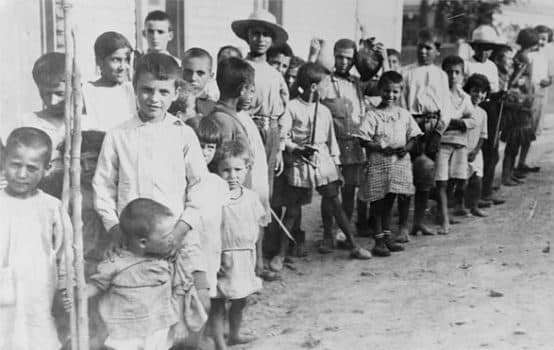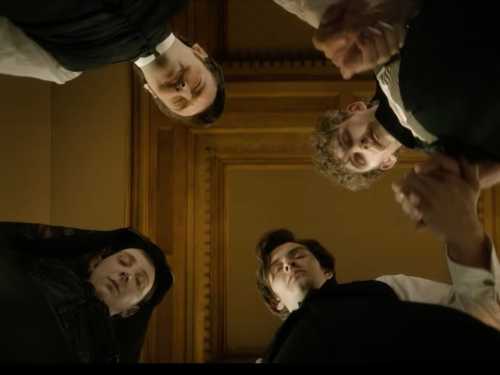
Browsing in the video store (to hell with Netflix!), sedulously avoiding superheroes, sex comedies, and Amy Schumer, I picked up the recent release Ithaca, hoping it might be a satire on that Upstate New York college town. ’Twas even better: a faithful remake, directed (ably) by Meg Ryan, of The Human Comedy, William Saroyan’s tale of a telegraph messenger boy who delivers tidings of death to the people of his small California burg during the Second World War.

This article appears in the January/February 2018 issue of The American Conservative.
I had read the book and watched the 1943 Mickey Rooney version in high school, but it was not until I married a half-Armenian girl that I paid proper attention to Saroyan. For the initiate into the Armenian-American mysteries soon learns the names and faces carved into the culture’s Rushmore, or Ararat. There’s Cher (Sarkisian)—a half-breed, as her Sonny-less hit tune went; Tonio K (Steve Krikorian), a genre-busting songwriter (punk? Christian? wise-guy humanist?) whose album Ole is just superb; and there’s SCTV’s Andrea Martin and Ross “Alvin and the Chipmunks” Bagdasarian and the guy who played Mannix and we won’t even mention Dr. Jack Kevorkian or the Kardashian klan.
But above all there is William Saroyan: “the most famous Armenian of all time,” as his son Aram wrote in his astoundingly bitter memoir Last Rites. A winsome sentimentalist, his stories an odd mix of naïveté and worldly wisdom, Saroyan was a Christian pacifist and a Fresno-bred anarchist—that is, an old-fashioned American, which is perhaps why he is so ludicrously out of joint with the body politic today.
The Second World War, whose death notices Homer Macauley of Ithaca delivers, “ruined his life,” said Saroyan’s ex-wife, Carol Marcus. He made a deal with Southern agrarian turned censorious superhawk Herbert Agar of the Office of War Information. Saroyan would churn out a patriotic novel in exchange for a month-long furlough with his wife and son.
Constitutionally incapable of writing spread-eagle propaganda, Saroyan turned in a novel, The Adventures of Wesley Jackson, about a shy draftee who comes to believe that “our own Army was the enemy.” Wesley concludes, “Human beings must not murder one another. They must wait for God to take them in His own good time.”
Bad career move, Bill! Agar rejected the novel, canceled the leave, and threatened Saroyan with a court-martial. When the book was published after the war, its author was reproved for breaking martial lockstep. Like other midcentury nonconformist writers who refused to accept the premises of American Empire—Robinson Jeffers, Edmund Wilson, Gore Vidal—he was vilified, and grew embittered.
Meg Ryan’s film was panned, unfairly, and did as little box office as my own Copperhead. (Sorry: I’m still smarting from my failure to earn a Best Adapted Screenplay Oscar nomination, for which I blame the backstage machinations of Harvey Weinstein, Kevin Spacey, and whichever Creep of the Week is being pilloried as you read this.) But then Armenian-related films always get the shaft, not excluding Atom Egoyan’s Ararat and last year’s The Promise, a big-budget epic about the Armenian genocide of 1915-1923, which the entertainment-industrial complex ignored. Hell, even the Cambodians got The Killing Fields.
The one constant in human history is that no one cares a whit about the Armenians.
My late father-in-law, Vasken Andonian, would not have been surprised. Ken was raised in Aleppo, back when Syria was a safe and welcoming haven for diaspora Armenians. He was a dry wit, a cultured man who took great pride in his heritage, but underneath his wry smile was always a hint of sadness, which one expects to find in the son of Holocaust survivors. He told me the story, over a Chinese buffet, of how his conscript father had escaped a massacre by Turkish soldiers thanks to a heads-up from a kindly Turkish man from his village. Saroyan would have liked that twist.
I am an odar—the amusingly pungent Armenian word for foreigner, or outsider—but I feel a twinge of recognition whenever I come across someone whose surname ends in -ian or -yan. A landsman!
My father-in-law and I had only one argument that I can recall, and that amounted to a single exchange in 1990 about the Gulf War, which Ken briefly supported but later turned against.
“Your problem, Bill,” he said as I made my isolationist case, “is that you haven’t seen enough of the world.”
“And your problem, Ken,” I replied, “is that you’ve seen too much of it.”
Now I feel guilty. I never did read Franz Werfel’s The Forty Days of Musa Dagh, the celebrated novel of the Armenian genocide that Ken urged upon me. This winter…I promise. But don’t wait for the movie. The extermination of 1.5 million Armenians is of less than zero interest to Hollywood.
Bill Kauffman is the author of eleven books, among them Dispatches from the Muckdog Gazette and Ain’t my America. He also wrote the screenplay for the feature film Copperhead.
Sourse: theamericanconservative.com






